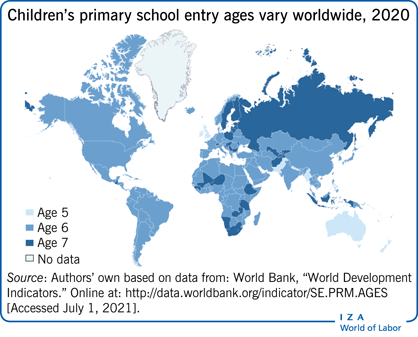Elevator pitch
There is a widely held belief that older students, by virtue of being more mature and readier to learn at school entry, may have better academic, employment, and earnings outcomes compared to their younger counterparts. There are understated, albeit important, costs to starting school later, however. Compulsory school-attendance laws may allow these same older pupils to drop out of high school earlier, which could adversely impact their employment; entering the workforce later also has implications for lifetime earnings and remittances to governments. Overall, research suggests that school-age entry policies can improve student achievement in the short term, but the long-term impacts are currently not well-understood.

Key findings
Pros
While most countries have been lowering school starting ages, an opposite trend has been occurring in the US.
Being the oldest student within a group has large positive effects on short-term outcomes such as test scores, special-needs diagnosis, and leadership.
Test score age gaps are of a similar magnitude across social/economic status, race/ethnicity, gender, deciles of birth weight, gestational age, and school quality.
Grade retention policies and the postponement of tracking may offset some of the disadvantages associated with younger school starting ages—especially among students with low-income backgrounds.
Cons
The optimal school-entry age is unknown and likely to depend on contextual factors, such as access to high-quality early childhood education, compulsory schooling laws, grade retention policies, and tracking systems.
More parents in the US are delaying their children’s school entry, despite mixed evidence of its benefits.
Findings on the effects of being older within a student group are inconclusive with respect to longer-term outcomes like educational attainment, employment, and earnings.